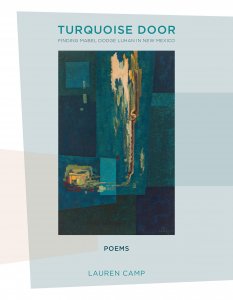Lauren Camp: Review by Todd Davis

Lauren Camp, Turquoise Door: Finding Mabel Dodge Luhan in New Mexico (3: A Taos Press)
In her fourth book of poems, Lauren Camp, the winner of the Dorset Prize, explores the history and spiritual presence of Mabel Dodge Luhan in New Mexico, particularly in relation to The Taos Art Colony and the many artists, thinkers, and writers who visited Dodge Luhan, including such luminaries as D.H. Lawrence, Willa Cather, Ansel Adams, Carl Jung, and Georgia O’Keeffe.
As in her previous work, Camp writes poems of sensual searching with sumptuous language that tilts the expected askew, suggesting that reorientation is not only necessary but good for us, because being thrown off-balance may reveal something long overlooked. As so much cognitive research suggests, we often see what we expect to see, notice what we’ve been taught to notice. Camp’s poems thwart such desires, but they do so graciously, their disruptions gentle and welcome. Camp confesses as she wrestles with the influence of Dodge Luhan, “I think you’d say we all die and then live. I am not quite sure. Please leave me two answers.” It becomes abundantly clear in the progression of this book that not even “two” answers will suffice; instead, like Dodge Luhan, Camp desires a multivalent world, open to myriad possibilities, myriad answers.
Camp challenges our perceptions of the “true world” by revealing her own incandescent longing: “Such a slim door and all / drowned desert light—oh, spine // of rib to rib to fire.” She asserts that she is awake “in flags / of light / in famish,” and as much as anything else, this book feels like one of hungering after, of seeking for a negotiated grounding in the work of another artist, a series of clues that may help her further along on the pilgrimage.
I suppose Turquoise Door is a book of ekphrastic poems, but I hesitate to use this term because while the poems do mention visual art works and visual artists, the poetic lens does not focus on these works of art but rather on the spiritual milieu those works were created out of.
To this end, Camp writes a series of letter-poems to Mabel that appear periodically in the collection. These epistles serve as signposts, mapping the poet’s search for a provisional answer as how to navigate a soul’s thirst in a desert place. As Camp explains in “Plucking the Lake from Devotion”:
The music of worship needs sometimes to echo
a body of water, the makers of breath
to be saved by unfaltering nature,
to be drawn from their traces, and travel
above to a clearing.
Dwelling in a place frequented by the spirits of so many artists, Camp is surrounded by presences, drowned in presences, as when she writes in “Temple of Lawrence” that “On the return, I pass through a gesture / of downed cottonwoods and appraise the strange gods // once more.” Camp’s “strange gods” are not D.H. Lawrence’s. But his audacity in calling out those gods in the American landscape encourage her to beckon to her own. Camp declares in “Cleaning the Labyrinth,” “It takes a long time / for redemption or something / similar,” and her poems are patient, accepting such wisdom.
The poet’s spiritual journey is one that moves outside the boundaries of simple sacrifice and redemption. In “Playback,” she acknowledges, “I’m not after / absolution,” and in “To Mabel: Letter beside the Fireplace,” she conjures the “death of water, death of the inner sun. Death of one’s own prayer.” For Camp, to follow the worn path of religious ideology and tradition is to imprison the imagination.
For mystical exploration, Mabel Dodge Luhan serves as an able guide. She is elusive, trying on the varied guises of freedom, offering encouragement to Camp to transform again and again. Yet because of these many transformations, Camp struggles to name Mabel. At first she asserts that “Mabel was trickster and impulse / and hero” but then reconsiders, proposing the question, “Or was she / unspooling fields /of wind?”
Turquoise Door is a formidable example of why we need more stories by women artists, by artists of color, by people silenced throughout history. We do not create art out of nothing. We are always speaking back to and speaking with those who came before us. If the art of those who came before is erased or silenced, then we find ourselves lost and wandering, bereft without a past.
Camp’s collaboration with Mabel Dodge Luhan’s life represents one of those remarkable and vitally important conversations between an artist working in the present moment, seeking to understand the desert landscape she is called to and its relationship to a woman who lived a century before her in the same place. It’s this conjuring, this imaginative correspondence between Camp and the life of Dodge Luhan and her contemporaries, that transports the reader in time and place, engendering a beauty associated with communion. As Camp professes, “What I know is all but the haunt of her voice. / I want to love her palest thoughts.”
Todd Davis is the author of six collections of poetry, most recently Native Species and Winterkill, both published by Michigan State University Press. His poetry has won the Foreword INDIES Book of the Year Bronze and Silver Awards, the Gwendolyn Brooks Poetry Prize, and the Chautauqua Editors Prize. His reviews have appeared in Orion, Rain Taxi, Green Mountains Review, The Bloomsbury Review, and Valparaiso Poetry Review. Davis teaches environmental studies at Pennsylvania State University’s Altoona College.